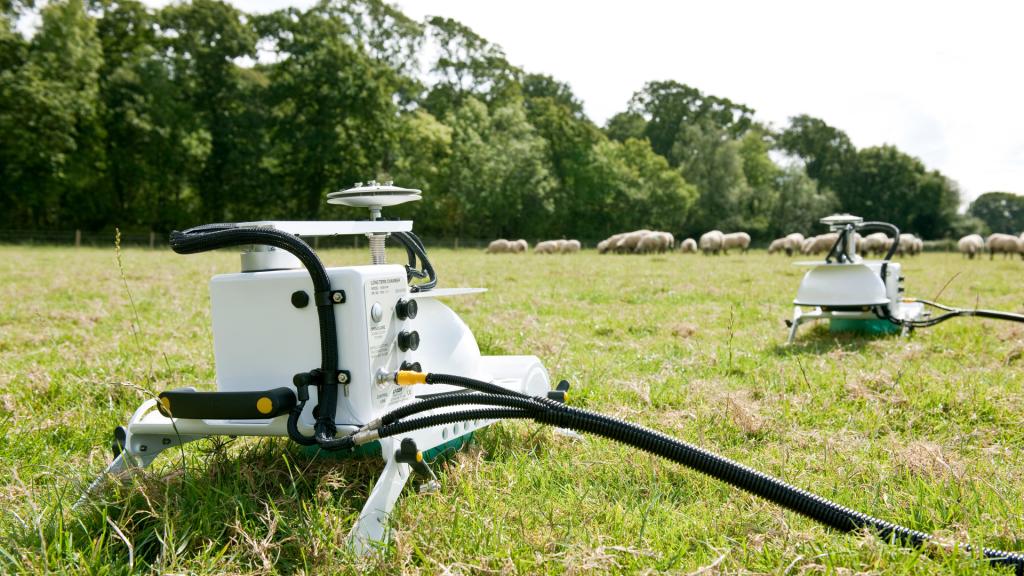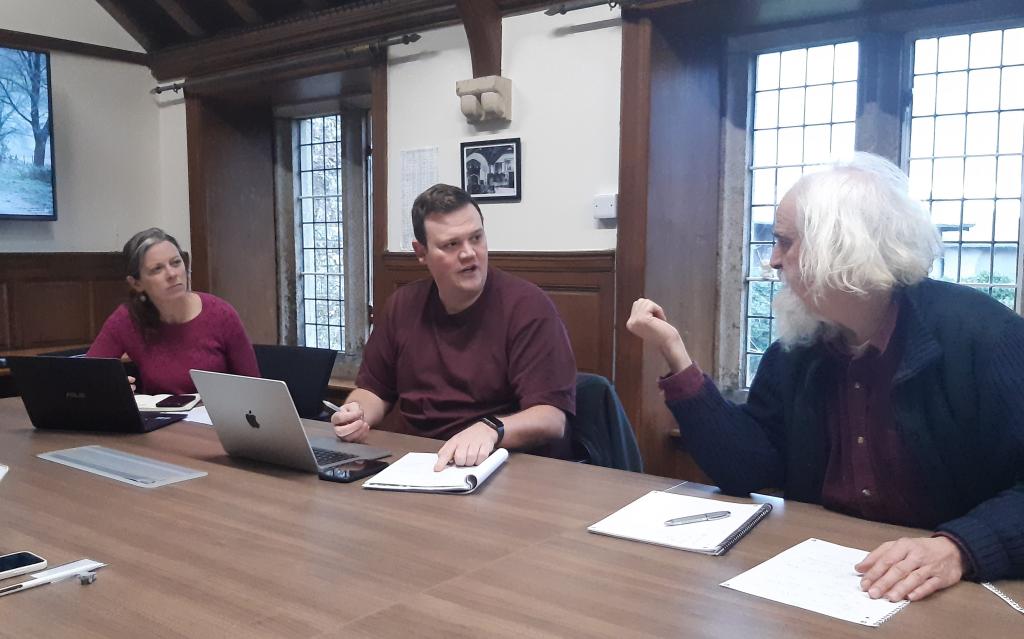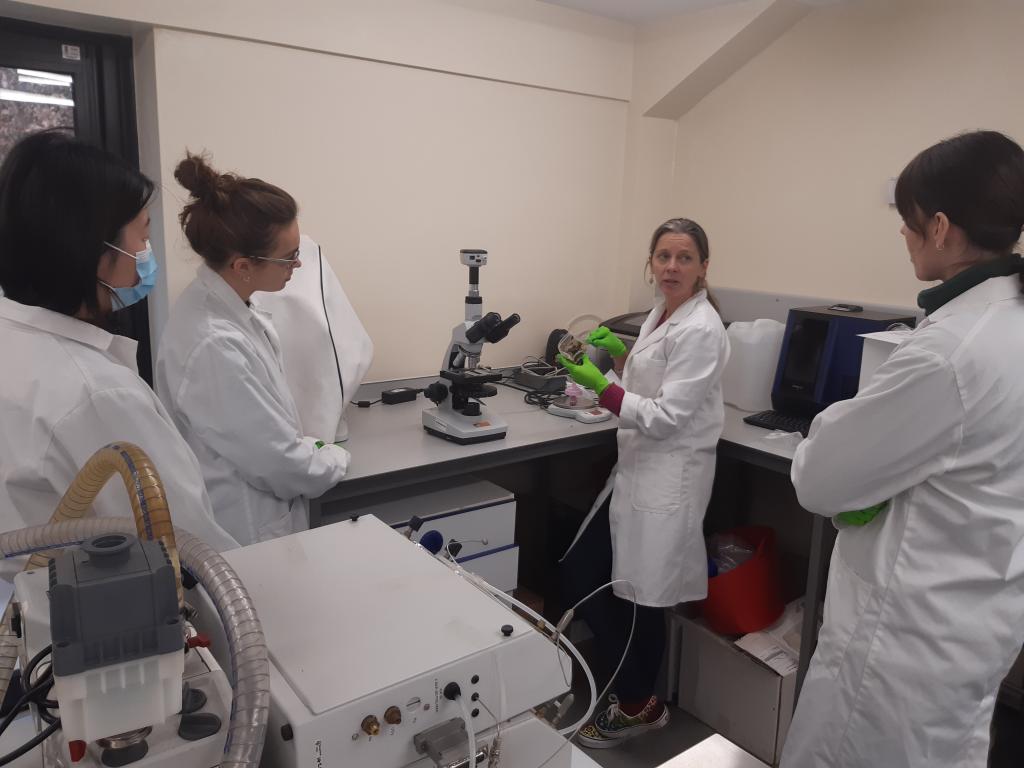United Kingdom
May 2, 2024
The North Wyke Farm Platform in Devon is unique. Often dubbed “Britain’s most measured farm”, this 350ha site in the rolling hills just east of Okehampton looks superficially like any other farm in the Southwest. But look more closely and you’ll start see some differences: flow meters in the drainage ditches, greenhouse gas monitors in the fields and tracking “fitbits” attached to the legs of the livestock.
Streams of data on every aspect of the farm and environment are being continuously collected, building up a detailed picture of the landscape, the natural systems and the impacts that farm activity is having on both.
In fact, so much data is being collected, that the scientists who run the facility want more people to use it. The farm-based research teams write dozens of papers every year - and studies are continuously running on many aspects of the farm, but there is immense potential for the data sets to be used productively even more.
“The farm platform is essentially a long-term experiment that compares farming systems through time,” says Phil Le Grice, Farm Platform scientific specialist. “It explores the trade-offs in farming – environmental and financial. Our aim is to widen the user community.”
 Almost everything at the North Wyke site is being measured and monitored.
Almost everything at the North Wyke site is being measured and monitored.
So why has this treasure trove of data been largely ignored so far? It has generated over 200 academic papers and attracted investment and collaboration with multiple partners. But more could be used, says Le Grice. “It is a resource of such scale that it requires a leap of imagination.”
“When the system was dreamed up, no-one at that time had envisaged the power of big data - the emergence of AI and machine learning. The big data community didn’t exist 12 years ago. It now does!”
The research questions the data can answer are varied – and extremely relevant to contemporary issues. For instance, ongoing experiments are looking at what might happen if we were to take livestock away from our farming systems and replace them plant-based products. Many may have entrenched positions the issue, but which approach actually delivers the most human nutrition with least environmental impact is contested. The length and breadth of the data collected enable the team to accurately assess the environmental cost of every component in a production system. For North Wyke’s researchers, then, it is not simply a question of working out how much protein is produced per hectare of farmland, but calculating how much bioavailable high-quality nutrition a system delivers and at what environmental cost.
“When the system was dreamed up, no-one at that time had envisaged the power of big data - the emergence of AI and machine learning. The big data community didn’t exist 12 years ago. It now does!”
And“When the system was dreamed up, no-one at that time had envisaged the power of big data - the emergence of AI and machine learning. The big data community didn’t exist 12 years ago. It now does!” it is not just the quantity of data the platform collects that makes the resource so useful. The North Wyke team have also built an expertise in data handling that has unlocked the power of the farm platform in other ways.
“You could level a criticism of the farm platform that it is a tiny muddy patch of farm in the back end of West Devon, so what does that mean for the world?” says Le Grice. “But our skills in spatial geography computation and analysis means that we have very robust ideas of how we can scale our findings. For example, we know how agricultural systems affect pollution in the water that runs off our small farm here. With our statistical data and computational ability, we know that we can scale that out to a landscape, to a county or to a whole different geography. Science like this can really power thinking at much larger scales.”
Under a new outreach programme, the team are hoping to attract interest not just from agricultural scientists, but also data specialists. And the first set of new customers are a pleasing mixture of both.
Josh Hodge is Senior Teaching Fellow in Quantitative Life Sciences at Imperial College in London. Working at Rothamsted early in his academic career he has quickly grasped what an incredible facility the Farm Platform is. He’s now an enthusiastic and pioneering champion for the resource and has brought three masters students, studying Ecology, Evolution and Conservation, to the site. This will help them to contextualise the data they are analysing as part of their masters projects, mainly focussed on how gastrointestinal parasites and feed nutrition affect livestock performance.
 Phil Le Grice (R) of the Farm Platform team discusses potential student projects with quantitative biologist Josh Hodge of Imperial College and parasitologist Claire Reigate (currently on an internship at Rothamsted sponsored by the British Society of Animal Science).
Phil Le Grice (R) of the Farm Platform team discusses potential student projects with quantitative biologist Josh Hodge of Imperial College and parasitologist Claire Reigate (currently on an internship at Rothamsted sponsored by the British Society of Animal Science).
In part, he says, he has brought the group here to show the students that there is a world of academic study that exists outside of universities, and he is enthused by what he has found.
“The data is super standardised and formalised in such a way that that makes it incredibly useful. Often data can be messy, but there is such a great infrastructure here that access to the information is really easy. There is first rate quality control and the data has gone through a whole set of processes by the experts that run this state of the art research platform infrastructure. The fundamental principles of replication and randomisation here are very important and hard to replicate anywhere else.”
Based at Imperial’s Silwood Park Campus, the visiting group are making the most of getting out into the real world and a larger trip is planned for the summer fieldwork season.
There is first rate quality control and the data has gone through a whole set of processes by the experts that run this state of the art research platform infrastructure.
One of the students is Ruby Chesney-Spedding. “I want to see where the data I am working with has come from and meet the people who have collected that data,” she says
“I’m using a dataset from 2015 to model parasite load over time - taking into account the climate – and seeing if risk indicators such as weight change, align with performance in cattle. Being able to come here can ask questions about the dataset and having these contacts is really helpful.”
Joely Merriman is also pursuing a masters course at Imperial. She is looking at how livestock productivity can be predicted by feed quality. She hopes that by coming to North Wyke she can better contextualise the data.
“When you look at a data set it looks very impersonal - just a set of data points…but coming here you can see the fields and go out and look at the platform systems. That helps you understand it all a lot better so that what you see in the data you can connect to a real-life scenario.”
 The Imperial College students get training in parasitology analysis from Dr Claire Reigate
The Imperial College students get training in parasitology analysis from Dr Claire Reigate
One key question for North Wyke, however, may be its potential to attract young researchers to such a controversial industry. Livestock farming has had a rough ride in recent years. Many climate activists agitate for it to be abandoned for the alleged damage it does to the planet.
Le Grice accepts that ill-considered choices in food production can be potentially harmful to natural systems, but sees a more nuanced picture than the one argued for by some campaigners.
“The choices between having livestock or not is not as environmentally cut and dried as has been presented. The students who come here are very sophisticated and have moved beyond that caricature.”
“Our concern is global, not just national. When you look at the way livestock is a component of diets all the world over - the cultural nuances, economic circumstances, land use and so on, we are in a world where society is already taking us to a massively increased reliance on meat and meat products. So, our obligation as scientists is to ensure that is done in as benign way as possible and if there are alternatives recognise how they might work. If you take livestock out, what do you replace it with?”
And as he points out, North Wyke even runs an experiment looking at what might happen if arable replaced livestock in Devon fields.
For their part, the students take a pragmatic view.
“I’m a vegetarian and I’m interested in sustainable farming,” says Chesney-Spedding. “To get rid of livestock is not a realistic solution for food security and livelihoods. So, the best thing to do is make livestock industry as sustainable as possible. It’s better to be more collaborative between scientists and farmers.”
Merriman agrees. “I myself don’t eat meat, but even I can understand livestock farming is integral for independent farmers’ livelihoods. Saying just get rid of it is a bit closed minded. We have to look at solutions that reconcile the demands of people and environment and find more sustainable approaches.”
Le Grice finds such thoughtful attitudes encouraging. He hopes that the resource the North Wyke team have dedicated much of their careers to, can now be used much more widely to address these challenges.
“It would be great to build up the campus here so that the opportunity for high quality field work is improved. Developing our on-site facilities for more visitors is the goal. But we also want an increase in access from remote users - supporting them by co-creating hypotheses or just letting them get on with it.”
“We hope to generate a real pipeline of high-quality masters students, PhD collaborations and researchers for the future. Our data resource is an easy step ladder to publication - and we’re good value for heads of department: fewer expensive trips, ready-made data sets. We’re all set to create a more vibrant and effective campus.”
Calling all course leaders: Got a great idea for making use of the North Wyke data sets? Need excellent data for your students to work on? The team at North Wyke would love to hear from you.
Some “ready to go” projects include:
- Relating spectral diversity through two main remote sensing satellites to the botanical surveys taken at the NW Farm-platform and the Rothamsted run ECN site.
- Using remote sensing information to look at the association between pastures diversity against ecosystem functioning stability.
- Develop algorithms to be implemented in Google Earth Engine to fill gaps of bad quality remote sensing data.
Develop and upscale statistical associations between current vegetation dynamic (estimated through remote sensing) with previous climate drivers. Specifically, develop the concept of “grassland memory” across grassland areas in the UK